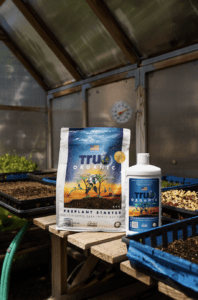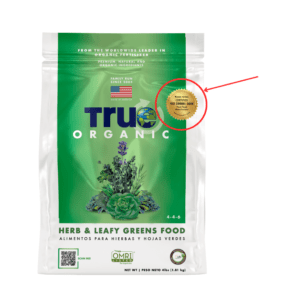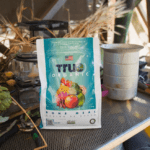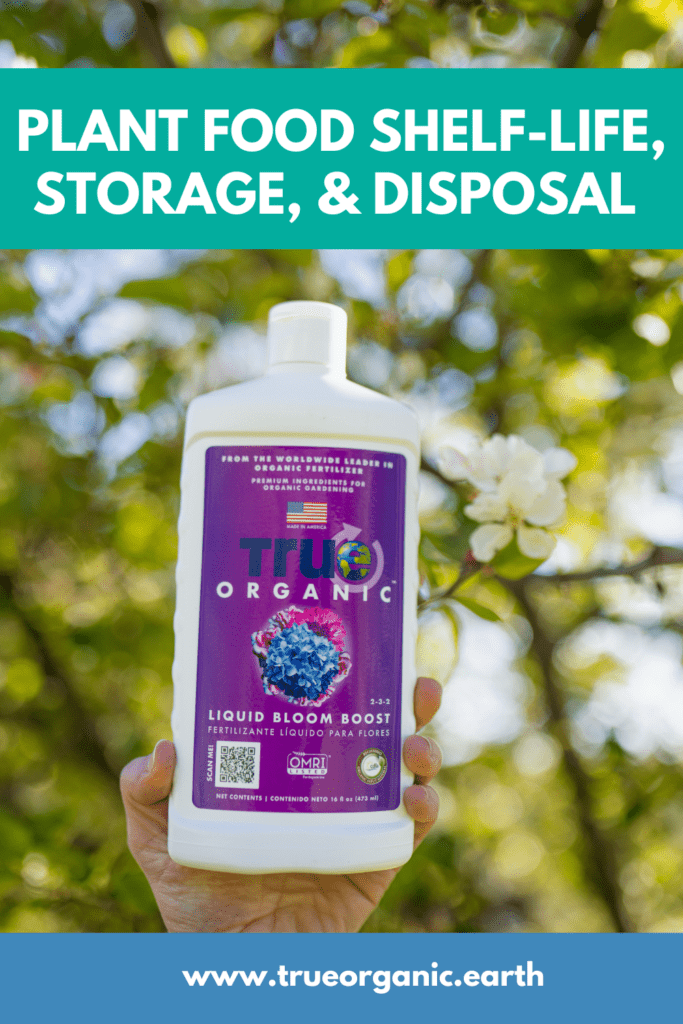May 30, 2023
Plant Food Shelf-life, Storage, & Disposal Dos and Don’ts
Plant Food Shelf-life, Storage, & Disposal Dos and Don’ts
You already know that all True Organic Plant Foods are Certified Food Safe, always made with ingredients from nature, and formulated to be best supplements for your home garden. But how much do you know about the shelf-life and storage of our organic, earth-friendly fertilizers? It never hurts to get a little extra advice from the experts when it comes to keeping your plant foods safe, secure, and effective.
We sat down with Mike Menes, Ph.D., our VP Food Safety & Technology, and Margaret McCoy, Ph.D., our Research & Development Agronomist, to ask the most common questions about storing, handling, and disposing of True Organic plant food in the best way. Here’s what we learned.
Storage
How should I store my True Organic plant foods?
Do store your True Organic plant food in a clean, cool, dry, protected place, away from moisture and direct sunlight.
Don’t leave your plant food bags or bottles outside, exposed to the elements.
Always protect your organic plant foods from rain, direct sun, and wild animals. We recommend storing them in a dark place, in a tightly sealed container.
True Organic plant foods are food!
Mike Menes reminds us that all the ingredients used to formulate these top-of-the-line, food safe fertilizers are from nature, for nature: ingredients like sugar beet extract, kelp extract, bone meal, and more. They’re organic (of course), biodegradable, and activated by water.
While everything we make is specially processed to be shelf-stable for years (read on for more on your plant foods’ shelf-life), the ingredients in these soil-supporting formulas have a strong propensity for high biological activity.
Premature exposure to water before being applied in your garden will cause that biological activity to happen in the package. Protecting your True Organic plant food from exposure to water ensures that biological breakdown only happens in the ground, where it can contribute to the overall soil health.
Shelf-life & Potency
How long do True Organic plant foods last? Can they go bad? How can I tell if they’ve spoiled?
Do get familiar with how your plant foods smell and look when you open them — check out the consistency, color, etc. — so that you can tell if something’s gone wrong.
Don’t use a product if it looks or smells questionable. Just like food!
You may have noticed that the bottle or bag doesn’t have an expiration date. Does that mean our products last forever?
When stored properly and protected from environmental pressures like moisture, our plant foods can stay fresh and potent for years. While we can’t know that True Organic fertilizers would come out of a time capsule just as effective as the day they came out of our production and testing facilities in Helm, California, they’re pretty darn stable.

Our granular plant foods are low-moisture to preserve the integrity of their organic ingredients and liquid plant foods are stabilized for long shelf-life. All our fertilizers are intentionally formulated and packaged without the use of synthetic chemicals or preservatives but instead control other physical properties like low moisture content to increase the longevity of the finished product.
When you mix them with your soil and water your plants, that’s when these premium biological ingredients start to break down and feed your plants. Just like your own food, if it doesn’t look quite right — or smell right, or just seems off in any way — toss it.
“We’ve tested our product (that we supply in bulk to big organic farms) that’s been stored for multiple years and seen no significant degradation in NPK values and no contamination by pathogens,” Mike says.
“There can be small degradation over time,” Margaret notes, “but if the product is stored properly, it shouldn’t impact overall performance.”
Keeping it fresh
After a long time in storage (say, over winter) what should i do to prepare True Organic plant foods for use?
Do simply shake the bottle or bag to mix up any ingredients that may have settled.
Don’t add anything (like water). “That’ll change the [nutrient] analysis,” warns Margaret. “Just shake it up to mix the granular food and bring the liquid back into solution. Even if you have some settling in granular food, it’s still valuable.”
What about germs?
Should I be worried about pathogens in my plant food after it’s been in storage?
Do remember that all True Organic products are certified food safe to the highest standard and rigorously tested to ensure that they don’t contain pathogens when they’re packaged.
Don’t give pathogens a chance to come into contact with your plant food!

We use a precisely designed heat-process “kill step” to eliminate any pathogens in the process of making True Organic plant food, and each product is extensively tested to be free of pathogens.
Learn about the ins and outs of our food safety certification standards.
So while you can trust that your unopened True Organic bottles and bags are free of pathogens, be sure to store and use your plant foods in ways that protect against contamination. (Read on to discover some ways that contamination might happen, and how to get rid of your plant food if it does.)
Wash your hands and tools before and after use, keep pets and animals away from True Organic products, and return partially used packages to a tightly sealed, clean container.
Wild animal invasions
What should I do if wild animals have gotten into my plant food?
Don’t use any True Organic products if you can tell that animals (like mice, rats, opossums, racoons, or birds) have gotten into them.
Do protect against animal intrusions by storing your organic fertilizer in a container, on a shelf, and/or in an enclosed spot where animals can’t reach it.
Is it okay to use True products after wild animals have gotten into them? Mike and Margaret wouldn’t recommend it — in fact, they’d highly encourage you to toss those products.
“You don’t know what kind of animal got in there, what they’re carrying — so just get rid of it,” says Mike. “It only takes one little bit to contaminate a product (with a pathogen).”
Why would an animal want to eat our plant food, anyway?
“It’s a high protein material with some minerals,” Mike reminds us. “Some ingredients that aren’t really edible — of course, you don’t want to eat gypsum, sulfur — but the protein component could be attractive to animals.”
True Organic plant food is made from materials from nature. Crab shell meal, seabird guano, blood meal, and the like all might be attractive to wild scavengers. Protect your animal neighbors by keeping plant food securely stored.
What about the health of a wild animal that might eat some of your plant food?
“If it does happen,” Mike says, “it is likely not harmful to wild animals that are accustomed to unprotected food sources, and also because these plant foods are mostly made from food ingredients and food by-products.” So there’s no need to call animal services or a wildlife protection agency unless you’re aware that there’s a sick or injured animal in your area.
What about pets? While our products have been manufactured to be free of human pathogens, they’re not meant to be eaten! Always contact your veterinarian and provide them with the product SDS sheet if you’re concerned that your pet got into your plant food.
(Please email hello@trueorganic.earth for the SDS sheet.)
Disposing with the earth in mind
How can I properly dispose of True Organic plant food?

Don’t put it in your home compost pile unless you have an extremely high-functioning compost operation.
If your plant food does get exposed to the elements or you see that animals have snacked on it, the best way to dispose of it is in the green bin.
Fertilizer typically shouldn’t be added to home compost piles, Margaret notes, because the huge influx of nutrients that fertilizer adds can overwhelm the microorganisms in the compost.
(Fertilizer can certainly be added to compost piles as a food source for microorganisms — but it’s essential that the compost is at tip-top functionality with good carbon-to-nitrogen ratio, adequate turnover, proper temperature, and ideal moisture level.)
“We consider our products to be part of the food chain,” Mike Menes says. “We want to try to keep anything we can from going into a landfill,” Mike says.
Everything we do at True Organic, we do with the earth in mind. Our mission is to help gardeners like you restore the soil we all rely on. That’s why we take such great care in developing the most effective plant foods with the most soil-enriching ingredients — and we want to keep those beneficial ingredients in the ecosystem, not in landfills.
About our experts
Read more about our entire R&D Team.
Mike Menes, Ph.D. – VP, Food Safety & Technology
For over 13 years, Mike has been on a mission to formulate fertilizer that makes a difference in the way we grow, consume and improve our bodies and the planet. With a Ph.D. in chemistry, he focuses on food safety and quality lab work. Mike is driven by his pursuit of technological improvements that help detect human pathogens and organic integrity — one of the reasons True Organic is a worldwide leader in organic, pathogen-free fertilizer for commercial farms and, now, home gardens.
Dr. Margaret McCoy, Ph.D. – Research & Development Agronomist
Based in Eastern Washington, Dr. Margaret McCoy is focused on conducting and collaborating on research trials with growers across the Pacific Northwest’s diverse cropping systems. Before completing her Ph.D. from Washington State University in Horticultural, she learned her love for organic agriculture and science from the family farm. She enjoys working with growers to conduct on-farm trials to support industry understanding of nutrient use efficiency based on data gathered from the region.
Show us your True Organic Plants
#GrowWithTrue
www.trueorganic.earth






